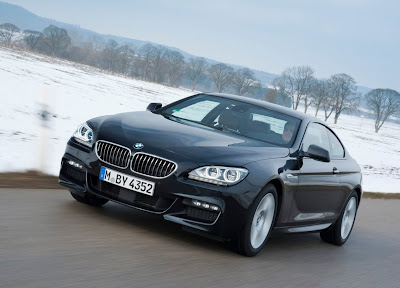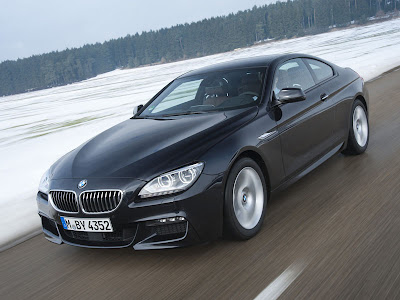BMW is set to add another variant of the Coupe and Convertible to the BMW 6 Series line-up with the arrival of the BMW 640d xDrive Coupe and Convertible in spring 2012. Intelligent all-wheel drive � making its debut in the BMW 6 Series � teams up with a six-cylinder in-line diesel engine featuring BMW TwinPower Turbo technology to take driving pleasure to another new level. The combination of a diesel engine and BMW xDrive all-wheel drive, which will also be found in the BMW 640d xDrive Convertible, gives the BMW 6 Series a spread of abilities none of its rivals can match.
BMW 640d xDrive Coupe
The new BMW 640d xDrive Coupe accelerates from 0 to 100 km/h (62 mph) in just 5.2 seconds. The 230 kW/313 hp diesel powerplant uses BMW TwinPower Turbo technology to ensure outstanding efficiency, and joins forces with the standard-fitted eight-speed Sports automatic gearbox to deliver exceptionally low fuel consumption and emissions. The xDrive system distributes the power generated by the engine precisely between the front and rear wheels as the situation demands. Pulling the strings behind the scenes is an electronic control unit which links xDrive up with the DSC (Dynamic Stability Control) system to ensure unbeatable traction, maximum safety, top-class handling and optimum power development in all weather and road conditions.
The instantaneous responses and pulling power of the diesel unit fitted in the BMW 6 Series enable it to do everything required of an engine fitted in a car with a sharp sporting focus. The output characteristics, acoustic profile, low vibrations and efficiency of the six-cylinder unit offer clear evidence of BMW�s expertise in the development of diesel engines.
Rewinding a generation, the introduction � for the first time � of a diesel variant into the previous BMW 6 Series likewise lent an extra dimension to the range. The new BMW 6 Series adds further lustre to the alluring profile of the exclusive and sporty, yet also economical, premium-class Coupe by taking performance and efficiency to new heights and, for the first time, offering the additional benefits of xDrive.
The latest generation of the most powerful diesel engine boasts displacement of 3.0 litres, a low-weight all-aluminium crankcase and the latest development of BMW TwinPower Turbo technology. This package of technology comprises multi-stage turbocharging and common-rail direct injection whose piezo injectors work with maximum pressure of 2,000 bar. The car�s two-stage turbocharging generates instantaneous and forceful power delivery, while the injection system sprays the fuel into the cylinders in precisely measured quantities to ensure clean and efficient combustion.
The latest multi-stage turbocharging technology responds more precisely than ever to the demands of different driving situations. At low revs a smaller turbocharger is activated, its low moment of inertia allowing it to go to work extremely rapidly. The compressed air from this small charger is sent directly to the combustion chambers via a bypass line. As the air no longer flows through the large charger, loss-free development of charge pressure is assured. Only when the driver asks for more power do the electronics prompt the bypass unit to bring the larger turbo into play. Added to which, variable turbine geometry for the smaller of the two turbos optimises the effectiveness of the turbocharging system in responding to the power requirement at any one time.
The result is an ultra-fast response to every movement of the accelerator. The engine delivers its peak torque of 630 Newton metres (465 lb-ft) as low down as1,500 � 2,500 rpm, with maximum output generated at 4,400 rpm. Powerful acceleration from a standstill and dynamic mid-range sprints are therefore dispatched with equal ease. The eight-speed Sports automatic gearbox is tuned precisely to the performance characteristics of the engine, and so allows the driver to exploit its impressive torque � maintained across a high rev band � to the full, for a sporty yet smooth driving experience. By contrast, in ECO PRO mode (likewise standard) the power reserves of the sporty diesel engine play a prominent role in ensuring a relaxed and extremely efficient driving style at low engine speeds.
ECO PRO mode, which is activated via the standard-fitted Driving Experience Control switch, carries out adjustments to the engine management, accelerator mapping and the shift characteristics of the automatic transmission. In addition, the output of electrically operated functions such as the climate control system, as well as the seat and exterior mirror heating are carefully regulated to ensure extremely efficient energy management. Special displays inform the driver of the extra range, in kilometres, achieved as a result. The BMW EfficientDynamics technologies fitted as standard on board the BMW 640d xDrive Coupe also include Brake Energy Regeneration, the Auto Start-Stop function, need-based operation of ancillary units and active air flap control.
The Driving Experience Control switch can also be used to call up SPORT, SPORT+ and COMFORT modes, and � if the optional Dynamic Damper Control or Adaptive Drive are selected � COMFORT+. As well as the accelerator progression, engine responses, power steering characteristics, intervention thresholds of the DSC stability control system and shift dynamics of the automatic transmission, this also allows the driver to adjust the damper settings and anti-roll control. Whichever mode he chooses, the driver is activating a pre-configured and coherent overall set-up which includes reproduction of the engine sound. Here, a sound module is used to enhance the engine�s natural acoustic components to suit the driving situation and the Driving Experience Control mode selected, and this soundtrack is then transferred into the interior. The system�s digital signal processing technology exchanges data directly with the engine management and adjusts its output to the engine�s revs, the amount of torque being produced and the car�s speed over the road. This gives the driver an impressively accurate impression of how hard the engine is currently working and of the power being unleashed, and provides an even clearer window into the car�s responses on the road.
The BMW 640d xDrive Coupe showcases the latest incarnation of the intelligent all-wheel-drive system. In addition to the variable transfer of power to the front and rear wheels, this technology also includes Performance Control, which divides drive between the right and left-hand rear wheels to suit the situation at hand.
In contrast to conventional all-wheel-drive systems, the electronically controlled BMW xDrive is set up not only to optimise traction on low-grip surfaces, but also to enhance dynamic performance through corners. The link-up of the all-wheel-drive system with the DSC (Dynamic Stability Control) function within the ICM (Integrated Chassis Management) system enables all situations on the road to be identified and evaluated to allow the necessary control interventions to be made at an early stage. These can be carried out by xDrive either on its own or in combination with Dynamic Stability Control or Performance Control. The power is distributed quickly and with great precision to where it is needed, ensuring that the driver enjoys the handling characteristics expected of a BMW � even under extremely dynamic cornering.
The xDrive system has been specially tuned for service in the BMW 6 Series, taking into account the car�s specific properties and characteristics. This bespoke set-up is underpinned by the principle of blending the traditional rear-wheel-drive qualities of BMW cars harmoniously with the benefits of distributing power between all four wheels. As with every all-wheel-drive BMW, 60 per cent of the engine�s power is sent to the rear axle in normal conditions and 40 per cent to the front wheels. This torque split can be adjusted in an instant to suit changing conditions.
This proactive analysis of the driving situation takes into account the data from the engine management system and information on accelerator position, steering angle, wheel speeds and lateral acceleration stored in the ICM system. Based on this extensive information, xDrive is able to finely control the distribution of power between the front and rear wheels to ensure that engine output is fully utilised at all times. This allows xDrive to nip oversteer or understeer in the bud � unlike conventional all-wheel-drive systems, which only react when at least one wheel is already spinning. If the car is threatening to understeer, a greater proportion of drive power is immediately sent to the rear wheels.This makes for sharper turn-in on the entry to a corner; in other words, xDrive improves stability before the driver is even aware of the need. Similarly, the system�s proactive capabilities allow it to correct oversteer tendencies at the earliest possible stage by directing surplus power to the front wheels. That means the benefits of all-wheel drive can be enlisted even before traction loss actually occurs.
Intelligently varied power distribution also has benefits for ride comfort; due to the stabilizing effect of xDrive, DSC now only needs to intervene in extreme situations. Only when optimal drive power distribution alone is insufficient to keep the vehicle on track does DSC intervene by reducing engine power and selectively braking individual wheels.
The xDrive system�s electronic control system allows the power split between the front and rear wheels to be altered almost instantly to suit changing driving conditions. It does this by adjusting the multi-plate clutch in the central transfer case, using a stepper motor. The higher the pressure on the clutch plates, the more power is transferred to the front wheels via a gear system. Conversely, when the clutch is completely open, all power goes to the rear wheels. The electronic control system is capable of varying the torque distribution in record-quick time: it takes just 100 milliseconds to fully open or fully close the clutch.
Performance Control improves these driving dynamics even further. Working with the xDrive control function, this electronic system uses precisely controlled braking and variable torque distribution to counteract the onset of understeer on low-traction surfaces and under particularly dynamic cornering, thereby improving agility. As soon as understeer is detected, the integrated electronic control functions of xDrive and DSC selectively brake the rear wheel on the inside of the corner. The resultant loss of propulsion is compensated for by an increase in drive power.
Articles Source : bmwnewshow





No comments:
Post a Comment